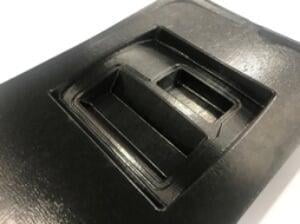UD-CCM recently revealed a new composite material feedstock at the Defense Manufacturing Conference held in Nashville, TN, December 3-6, 2018. Under the DARPA TFF program, the UD-CCM led-team developed a novel discontinuous carbon fiber composite feedstock with equivalent properties to continuous fiber composites (up to ~60% fiber volume fraction and 100% stiffness and strength translation). The in-plane stretchability of the aligned short fiber preforms enables conformability of simple planar preforms to complex geometries, eliminating the need for darting and complex ply patterns while minimizing associated scrap during composite layup. Forming demonstrations have shown metal-like formability with 1-3 minute cycle times and the ability to tailor the microstructure to improve forming characteristics based on fiber length in the millimeter range. A pilot facility has been installed producing the novel discontinuous carbon fiber composite feedstock for forming, with the potential to revolutionize the use of composite materials in military and commercial applications, as a cost-effective replacement for small complex geometry metal parts.
Conference attendees had the opportunity to view a scaled-down aerospace part that was vacuum formed from the Tailored Universal Feedstock (TuFF) material and guess its fiber count. This new material consists of a highly aligned discontinuous carbon fiber preform in thin-ply format, and can be combined with thermoplastic or thermoset resins for prepreg formats and tailored blanks for vacuum and compression molding, or used in dry format for infusion-based manufacturing processes.
Congratulations to the lucky $100 gift card winner, Timothy A. Spahr, Business Development Manager – KEPSTAN, Arkema Inc. whose guess of 45 million, came in the closest versus the actual fiber count of 57.3 million.
Spahr said of his interest in the TuFF material, “I am always looking for opportunities in the market where extreme performance is needed and to provide innovative process solutions to my customers with our Kepstan® PEKK copolymers. After our discussion at DMC about your TUFF material matrix, I was impressed with TUFF’s capability to allow for deep thermoforming of highly filled thermoplastic composites. It truly is an innovative process solution and I look forward to having TUFF as another arrow in my quiver for new application developments using KEPSTAN® based composites.”
UD-CCM is looking forward to partner with material suppliers, part producers and OEM’s to transition the technology to industry. For more information, please contact Dr. Dirk Heider at heider@udel.edu.

